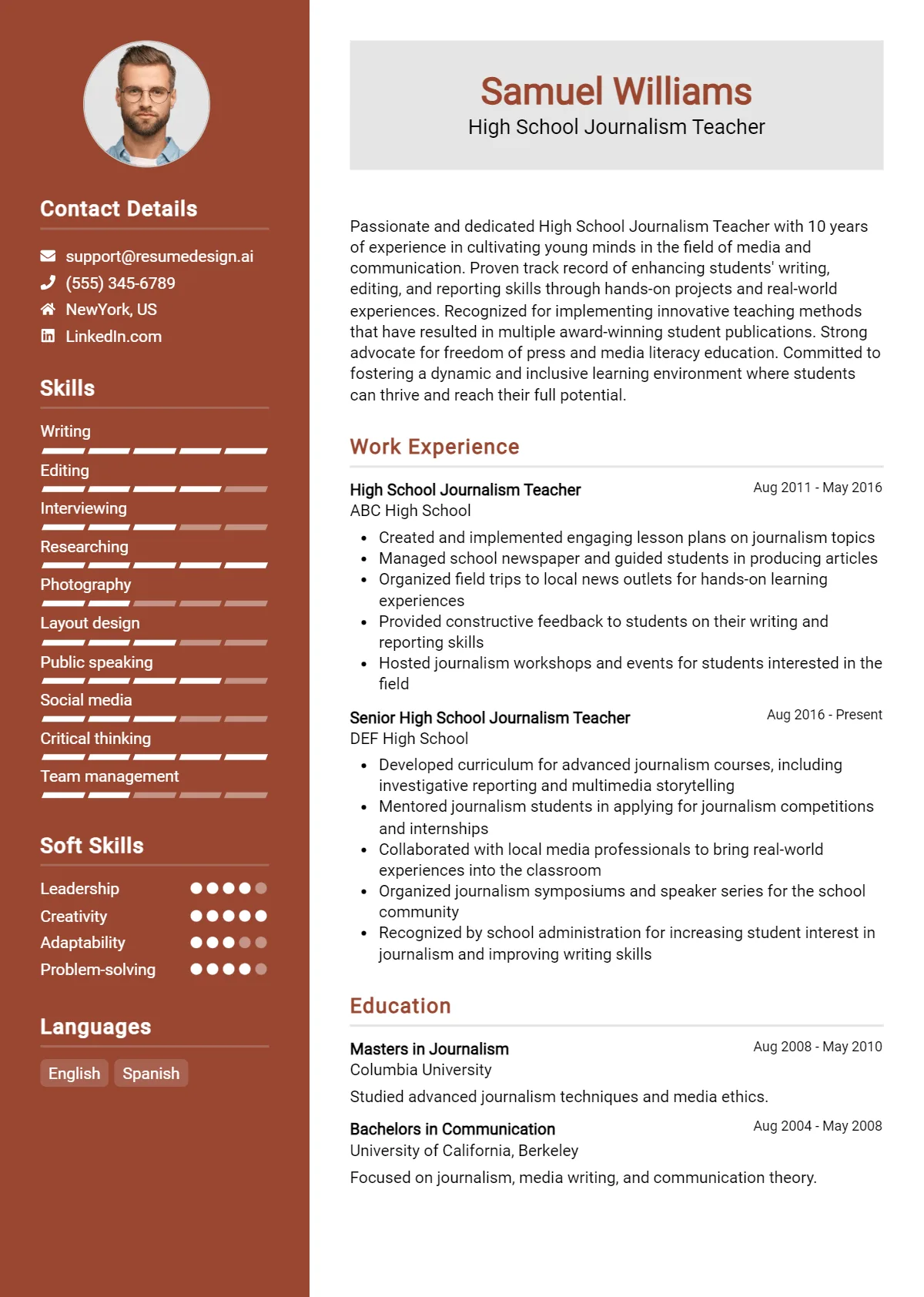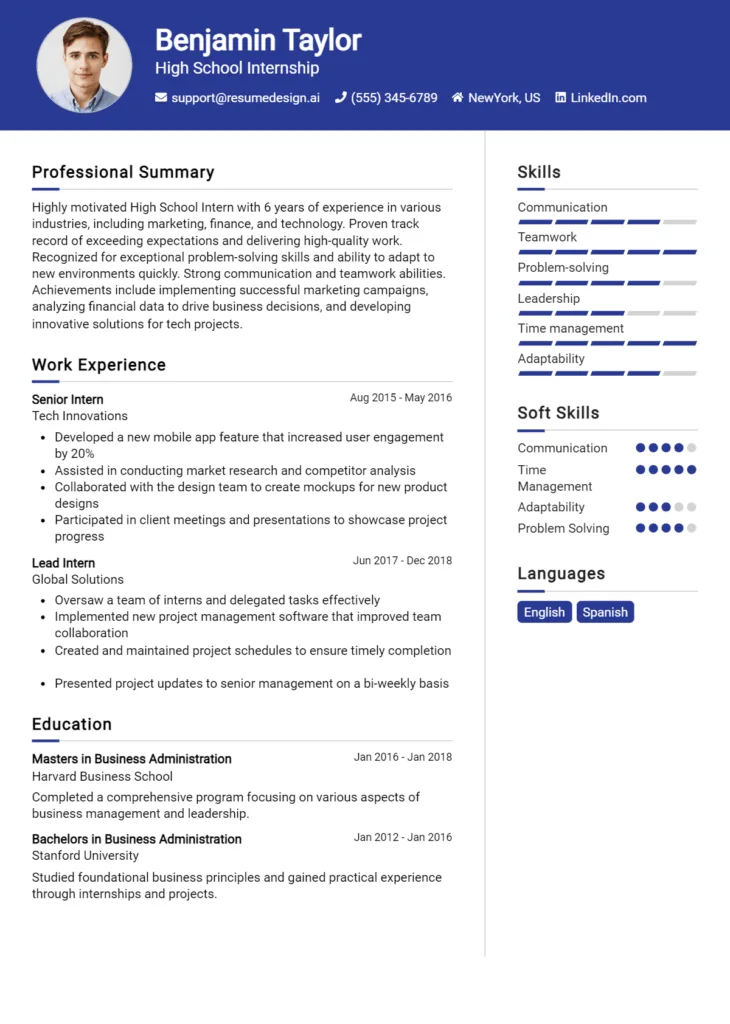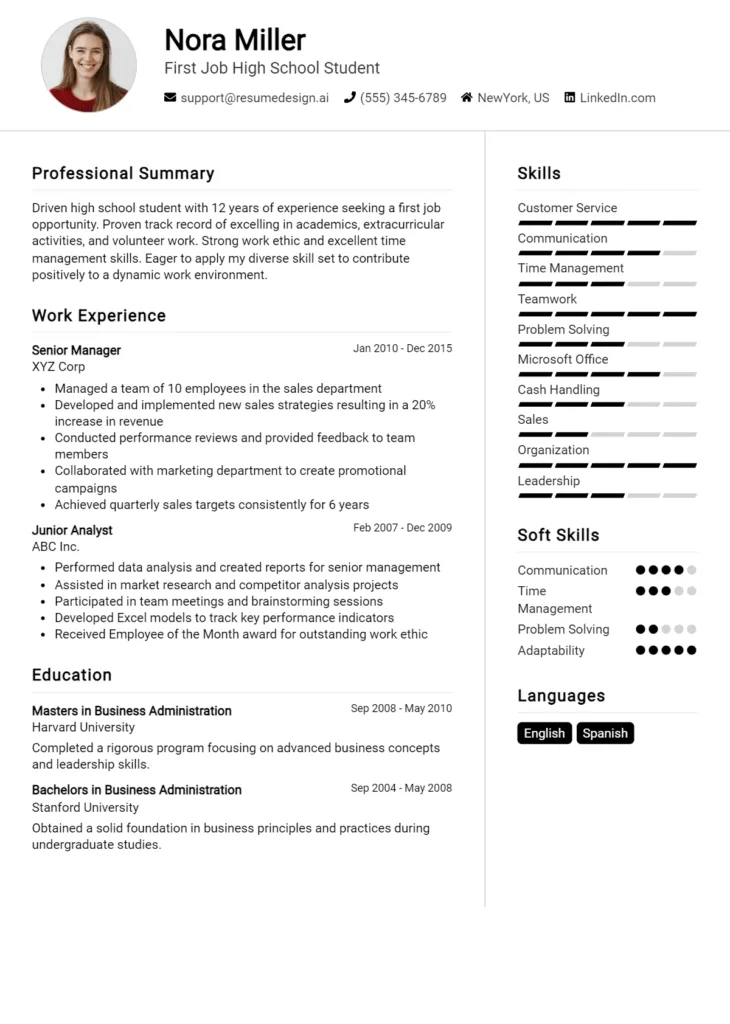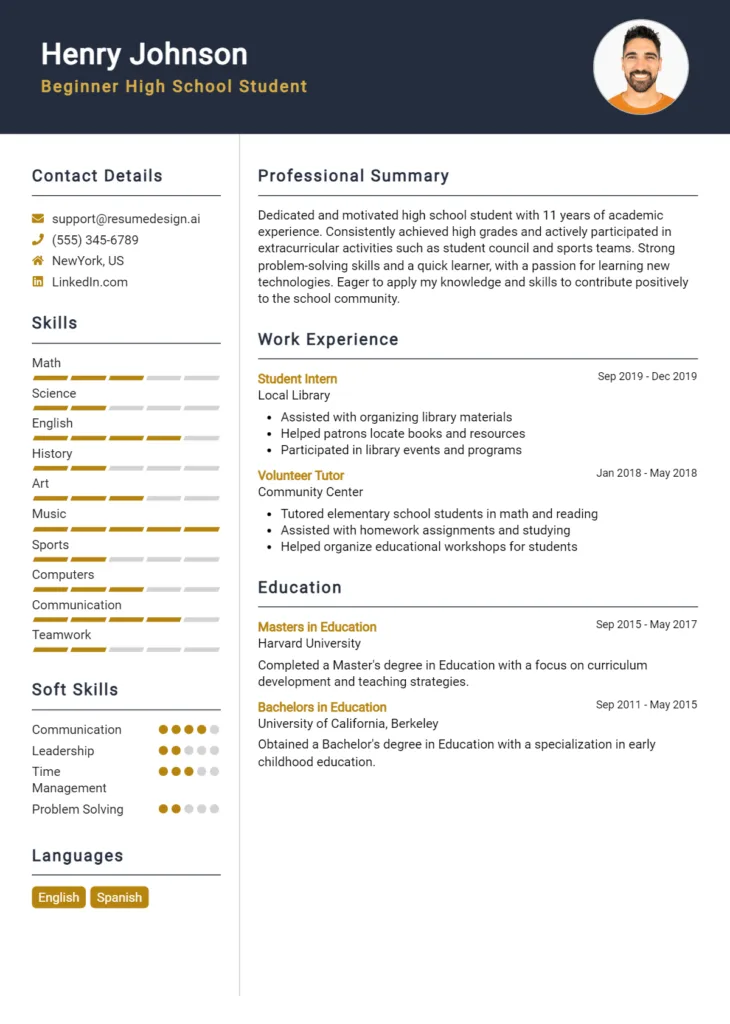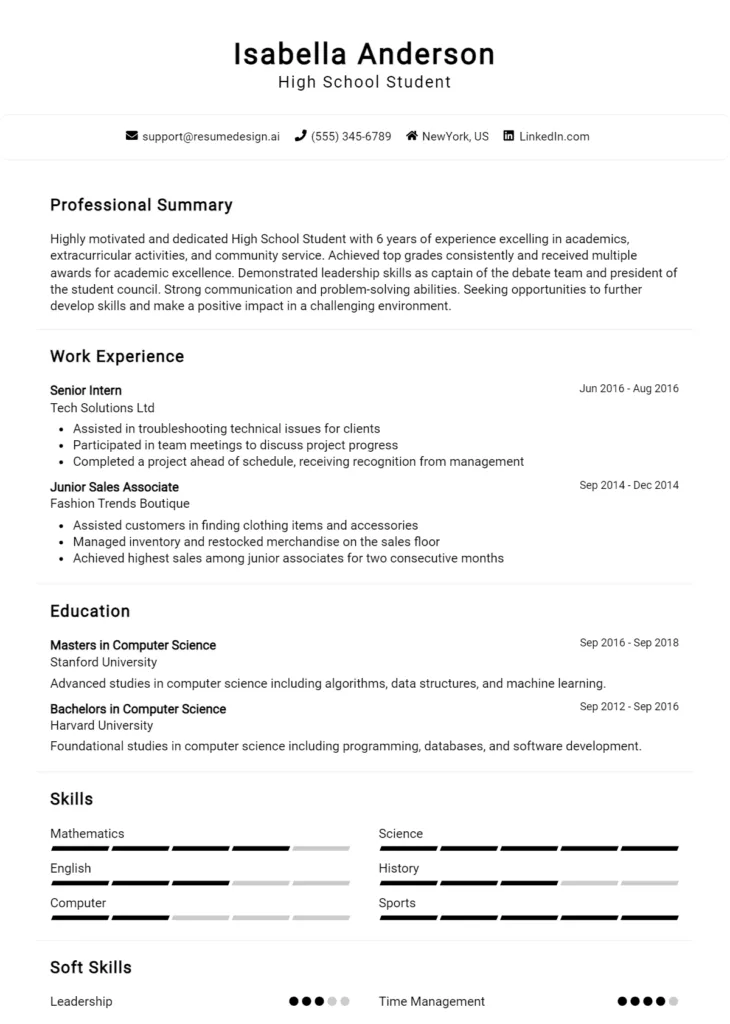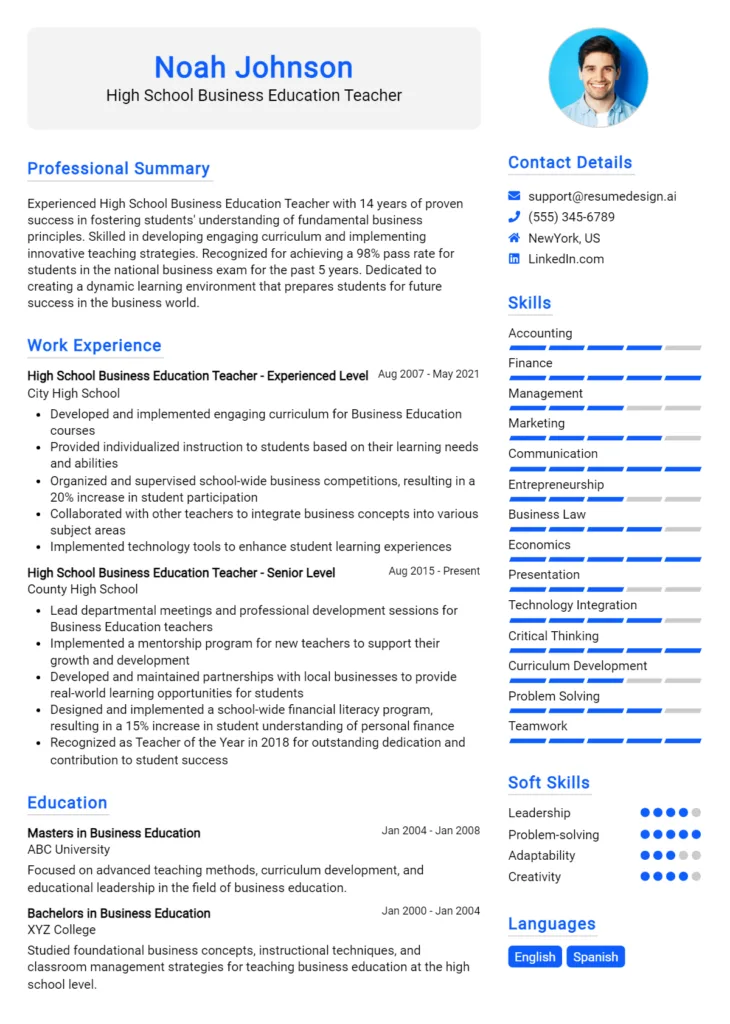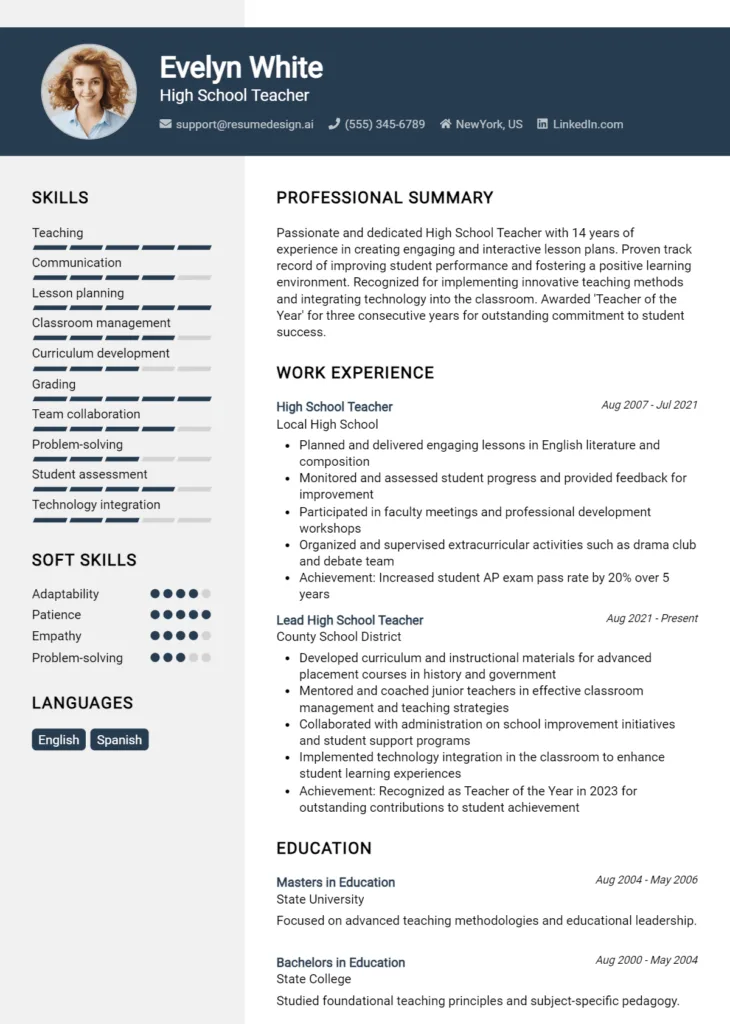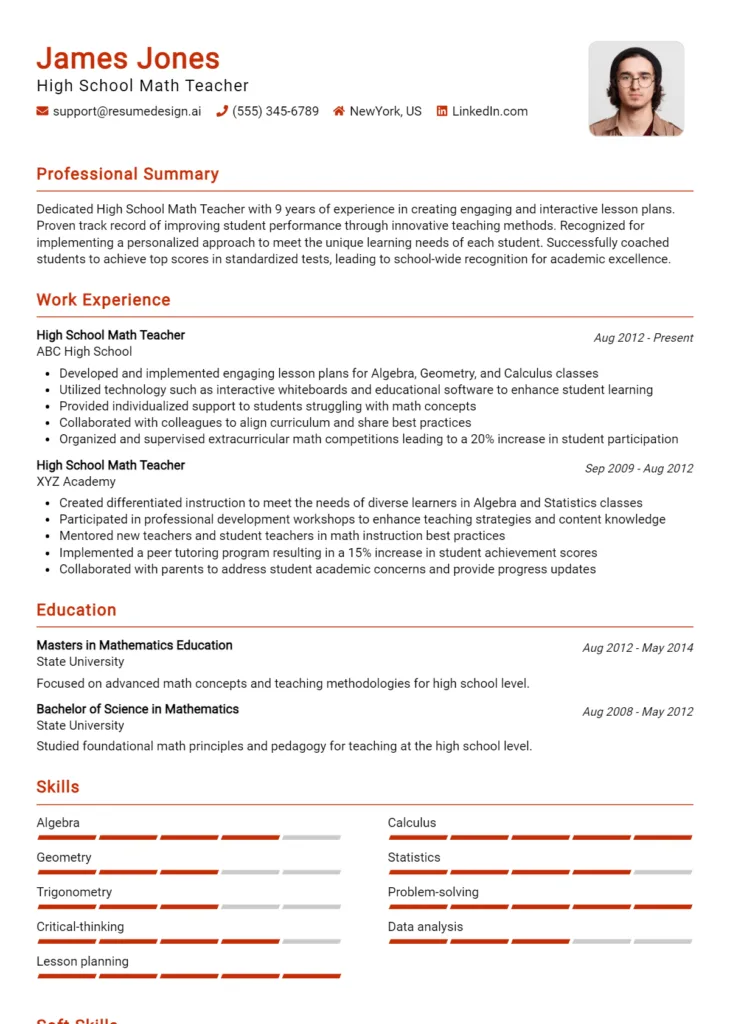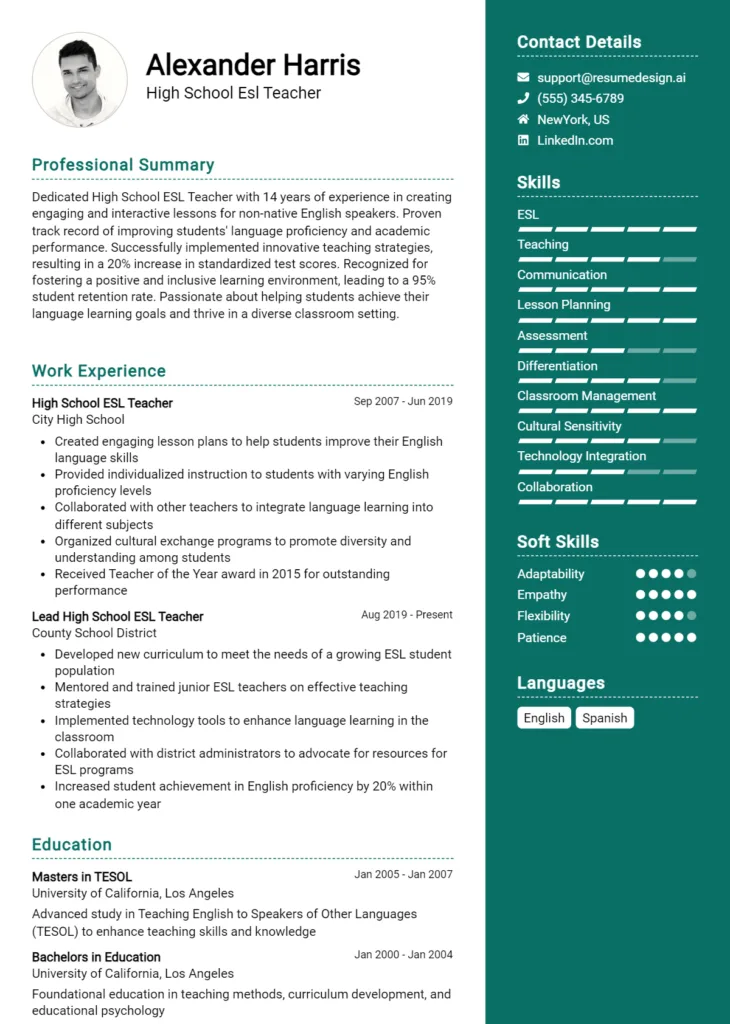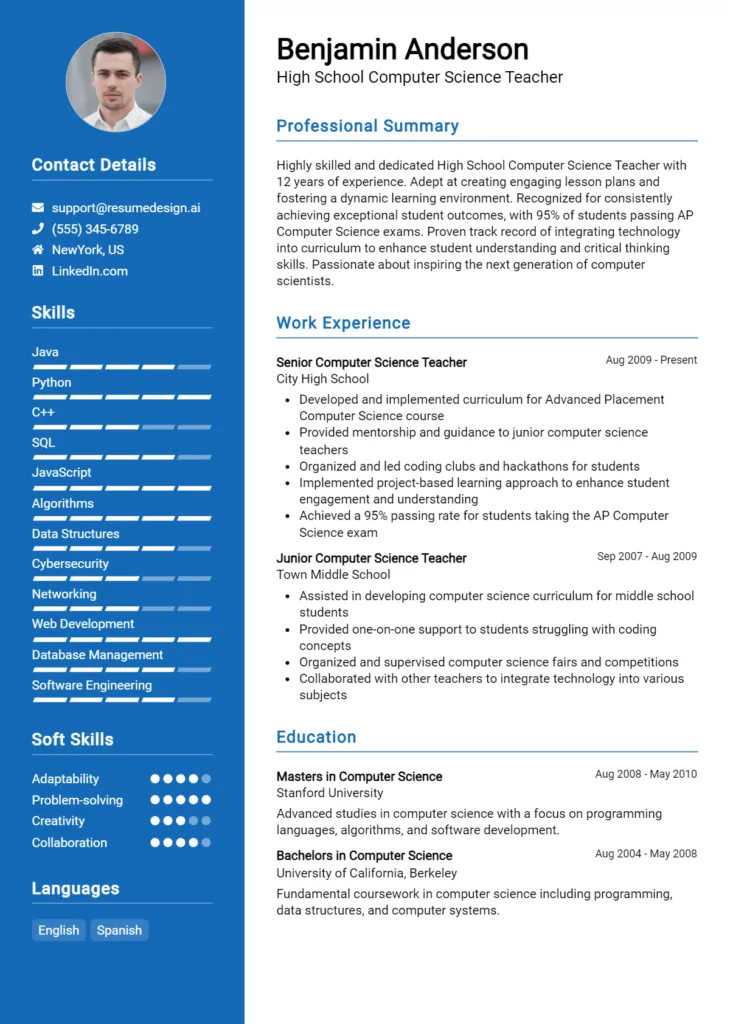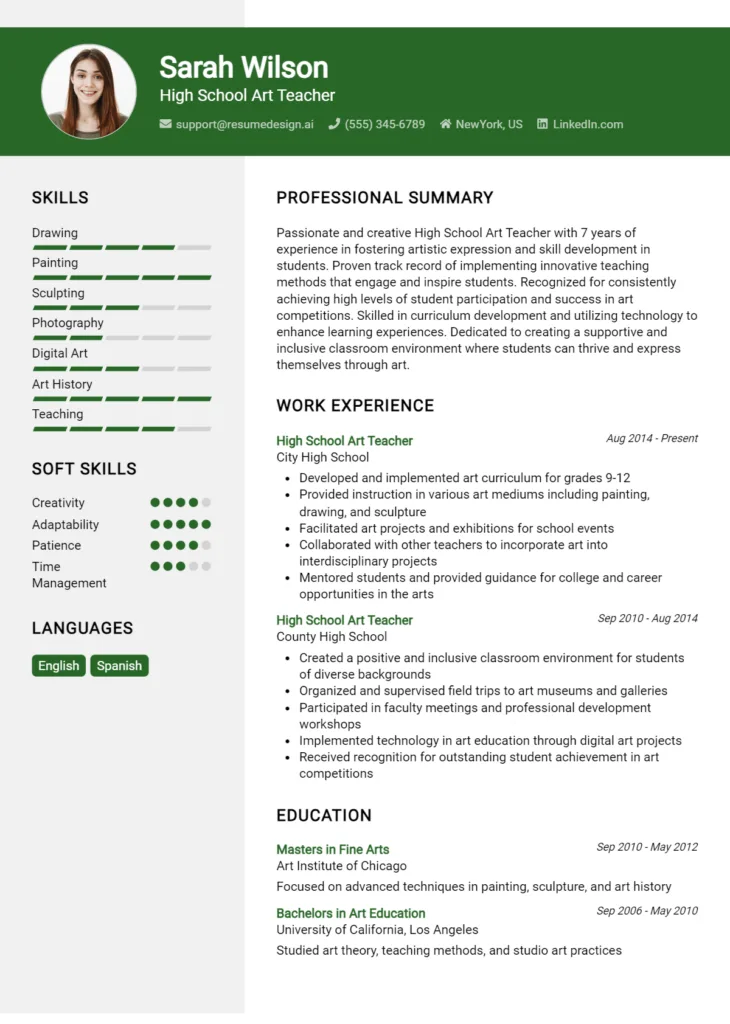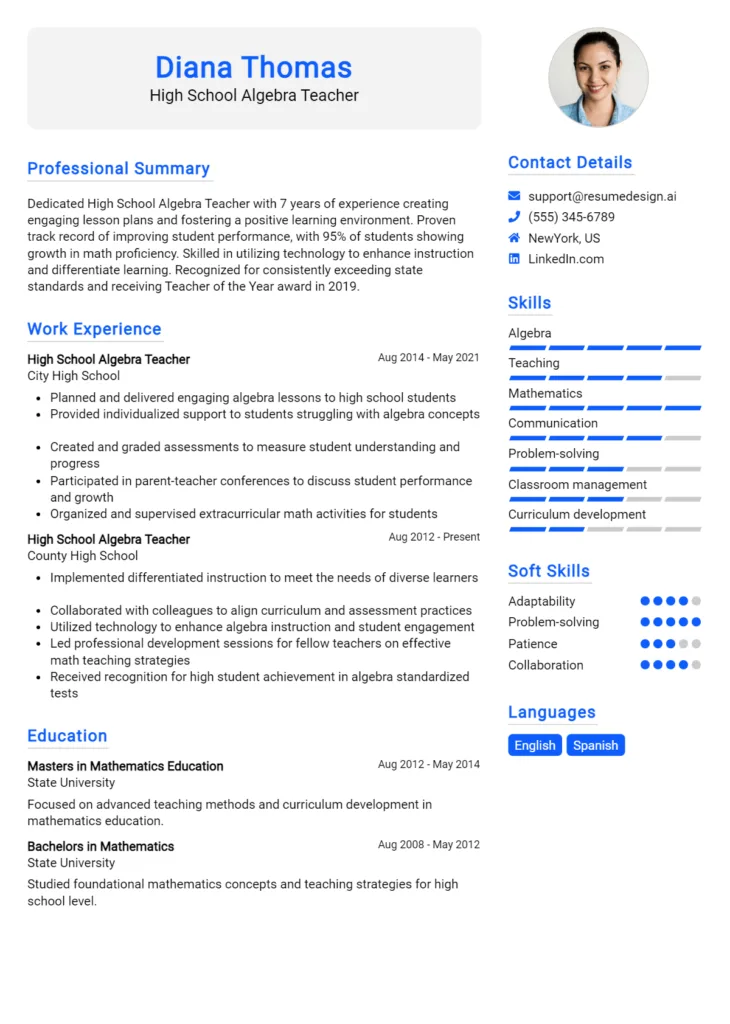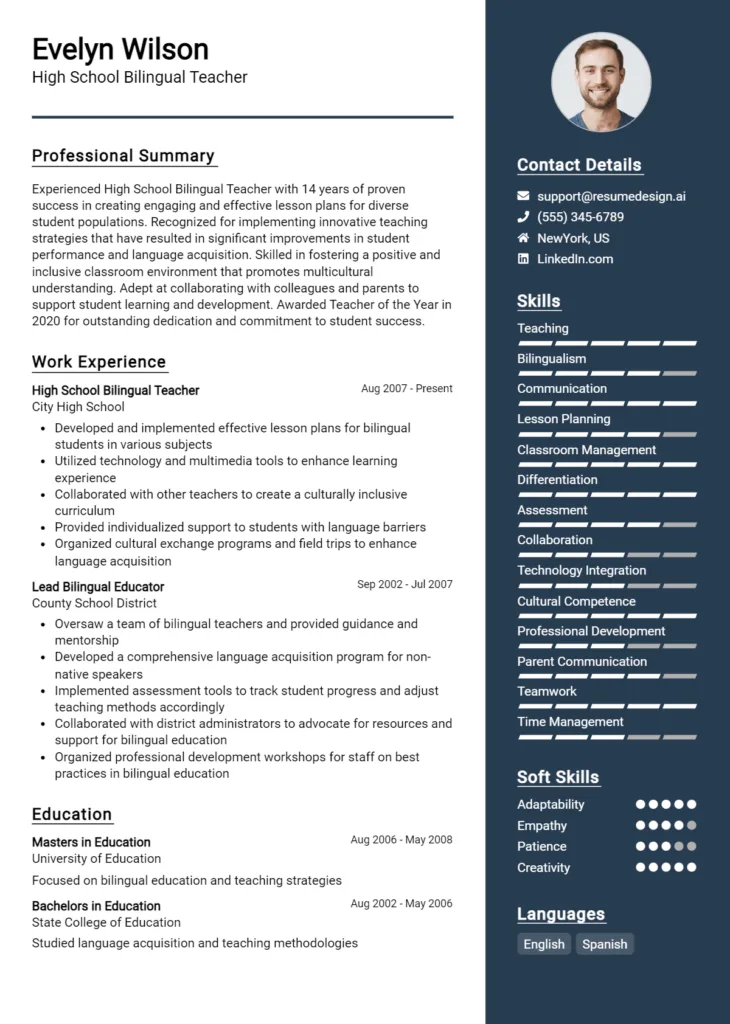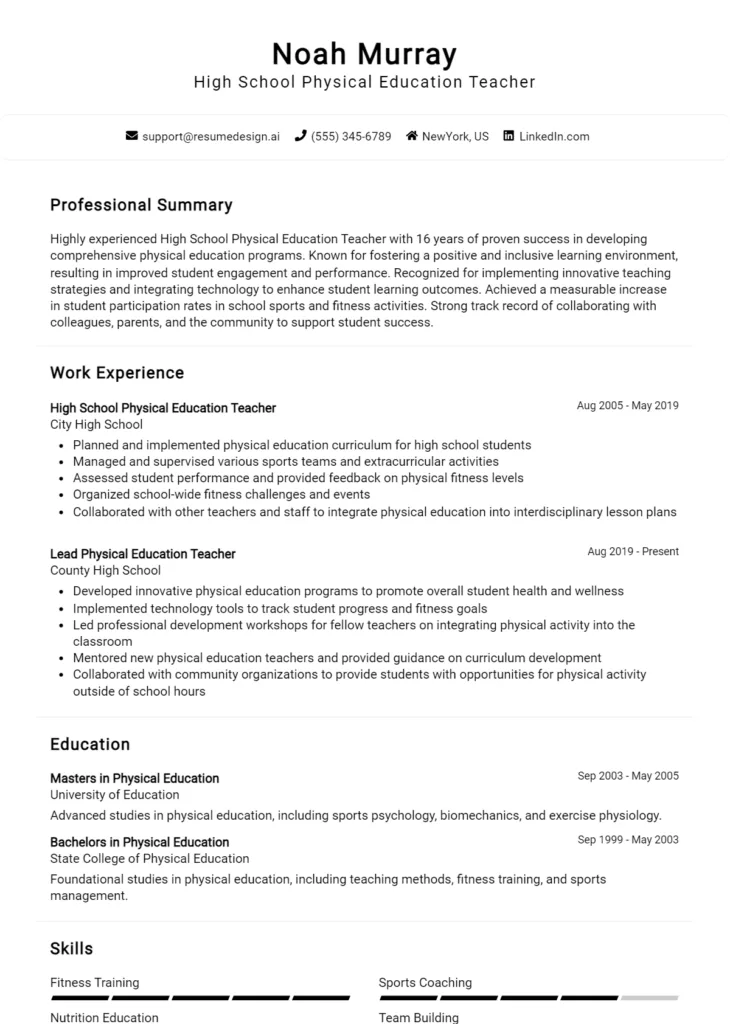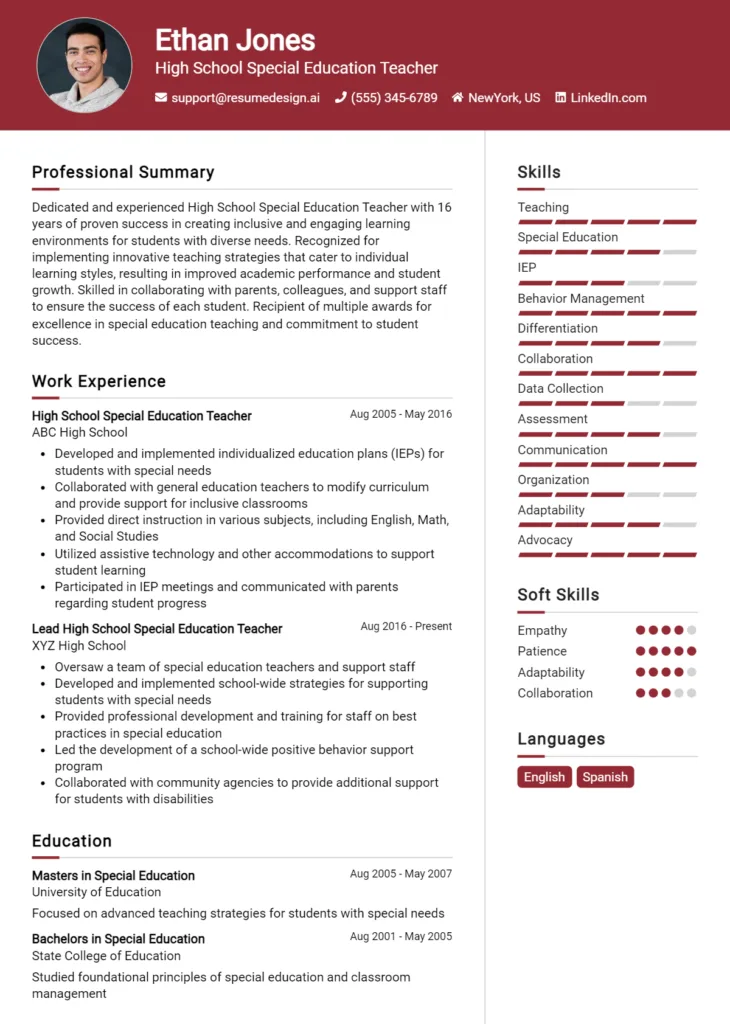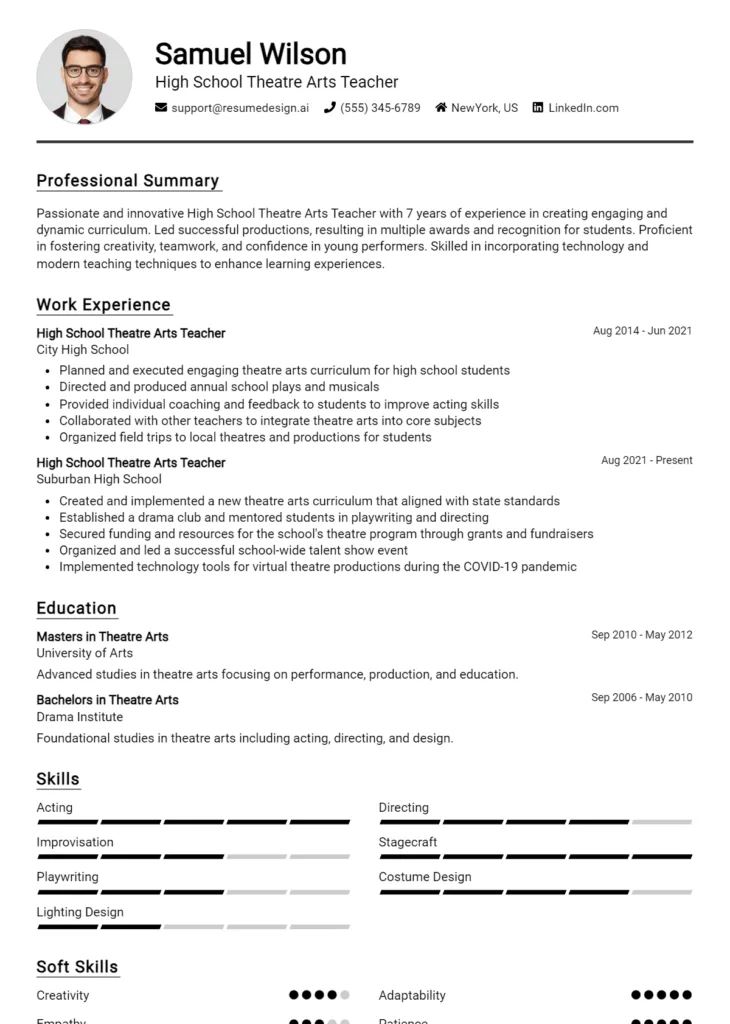High School Journalism Teacher Core Responsibilities
A High School Journalism Teacher plays a crucial role in shaping students' communication skills, critical thinking, and creativity. Key responsibilities include developing lesson plans, instructing students on journalistic principles, and overseeing student publications. This role bridges various departments, integrating English, media studies, and technology. Essential skills encompass technical proficiency in digital tools, operational management for classroom activities, and problem-solving to address student needs. A well-structured resume effectively highlights these qualifications, aligning with the overall educational goals of the institution.
Common Responsibilities Listed on High School Journalism Teacher Resume
- Develop and implement engaging journalism curriculum.
- Guide students in writing, editing, and publishing articles.
- Advise on the production of school newspapers and yearbooks.
- Teach ethical journalism practices and media literacy.
- Facilitate workshops on multimedia storytelling.
- Evaluate student work and provide constructive feedback.
- Collaborate with other departments on cross-curricular projects.
- Organize field trips to local news organizations.
- Mentor students interested in pursuing journalism careers.
- Maintain up-to-date knowledge of journalism trends and technologies.
- Encourage student participation in journalism competitions.
- Foster a supportive and inclusive classroom environment.
High-Level Resume Tips for High School Journalism Teacher Professionals
In the competitive landscape of education, a well-crafted resume is essential for High School Journalism Teacher professionals who wish to stand out to potential employers. Your resume serves as the first impression, acting as a marketing tool that showcases your skills, achievements, and unique teaching philosophy. It is critical that it effectively communicates your passion for journalism and education while highlighting your ability to inspire students. This guide will provide practical and actionable resume tips specifically tailored for High School Journalism Teacher professionals, helping you present your qualifications in the best possible light.
Top Resume Tips for High School Journalism Teacher Professionals
- Tailor your resume to the job description by incorporating relevant keywords and phrases that align with the school's mission and values.
- Showcase your relevant teaching experience, including internships, student teaching, and previous positions, emphasizing your role in journalism-related activities.
- Quantify your achievements by using specific metrics, such as the number of student publications produced or improvements in student engagement and writing skills.
- Highlight industry-specific skills, such as proficiency in media production, editing software, or digital journalism tools that are essential for modern journalism education.
- Include a section on professional development, showcasing workshops, certifications, and conferences attended that are relevant to journalism and teaching.
- Incorporate a portfolio link to showcase student work, your own publications, or multimedia projects that demonstrate your teaching effectiveness and creativity.
- Utilize a clean and professional format that enhances readability, ensuring that the most important information stands out to hiring committees.
- Keep your resume concise, ideally one page, focusing on the most impactful and relevant information that pertains to the journalism education role.
- Use active language and strong action verbs to convey your contributions and the impact you've made in your previous roles.
By implementing these tips, you can significantly enhance your resume and increase your chances of landing a job in the High School Journalism Teacher field. A polished and targeted resume not only highlights your qualifications but also demonstrates your commitment to inspiring the next generation of journalists, making you a more attractive candidate to potential employers.
Why Resume Headlines & Titles are Important for High School Journalism Teacher
In the competitive field of education, particularly in high school journalism, the importance of a well-crafted resume cannot be overstated. Resume headlines and titles serve as the first impression for hiring managers, encapsulating a candidate’s qualifications in a concise and attention-grabbing manner. A strong headline can instantly communicate the candidate’s expertise, passion for teaching, and ability to inspire students in the realm of journalism. By summarizing key qualifications in one impactful phrase, a well-designed headline sets the tone for the rest of the resume, making it more likely that hiring managers will take a closer look at the applicant's experience and skills. Therefore, crafting a precise and relevant headline is crucial for standing out in a crowded job market.
Best Practices for Crafting Resume Headlines for High School Journalism Teacher
- Keep it concise: Aim for a headline that is one line long, making it easy to read at a glance.
- Be role-specific: Tailor the headline to clearly reflect the position of a high school journalism teacher.
- Highlight key strengths: Focus on specific skills or accomplishments that demonstrate your qualifications.
- Use impactful language: Choose strong action verbs and adjectives that convey enthusiasm and expertise.
- Avoid jargon: Use clear and straightforward language that is easily understood by all readers.
- Incorporate keywords: Include relevant keywords from the job description to enhance visibility in applicant tracking systems.
- Showcase achievements: If possible, reference quantifiable achievements or experiences that set you apart.
- Align with your brand: Ensure the headline reflects your personal teaching philosophy and style.
Example Resume Headlines for High School Journalism Teacher
Strong Resume Headlines
Innovative High School Journalism Teacher Committed to Fostering Student Creativity and Critical Thinking
Passionate Educator with 5+ Years of Experience in Teaching Journalism and Media Literacy
Dynamic High School Journalism Instructor with Proven Track Record of Student Engagement and Success
Weak Resume Headlines
Teacher Looking for a Job
Experienced Professional Seeking Opportunities
The strong headlines are effective because they are specific, engaging, and immediately convey the candidate's qualifications and enthusiasm for the role. They highlight relevant experience and demonstrate a commitment to student development, which is crucial in an educational setting. In contrast, the weak headlines fail to impress because they are vague and non-specific; they do not provide any insight into the candidate’s unique strengths or suitability for the position, making them easy to overlook in a competitive job market.
Writing an Exceptional High School Journalism Teacher Resume Summary
A resume summary is a crucial element for a High School Journalism Teacher, as it serves as the first impression a hiring manager will have of a candidate. A well-crafted summary quickly captures attention by highlighting key skills, relevant experience, and notable accomplishments that align with the position. It should be concise, impactful, and meticulously tailored to the specific job being applied for, providing a snapshot of the candidate's qualifications that compels hiring managers to delve deeper into the resume.
Best Practices for Writing a High School Journalism Teacher Resume Summary
- Quantify achievements: Use numbers and specific data to demonstrate the impact of your work.
- Focus on relevant skills: Highlight skills that are directly applicable to the journalism teaching role.
- Tailor the summary: Customize your summary to match the job description and requirements.
- Use action verbs: Start sentences with strong action verbs to convey confidence and proactivity.
- Highlight teaching experience: Emphasize your teaching background and any relevant courses or programs you have developed.
- Showcase awards or recognitions: Mention any accolades received in the field of journalism or education.
- Keep it concise: Aim for a summary that is 3-5 sentences long to maintain clarity and focus.
- Reflect passion for journalism: Convey your enthusiasm for teaching journalism and shaping young minds.
Example High School Journalism Teacher Resume Summaries
Strong Resume Summaries
Dynamic High School Journalism Teacher with 8 years of experience fostering student creativity and critical thinking through innovative reporting projects. Successfully increased student participation in the school newspaper by 50% over two years while mentoring students to achieve top regional awards.
Dedicated educator and award-winning journalist with a Master's in Education and 6 years of teaching experience. Developed a multimedia curriculum that enhanced student engagement, resulting in a 40% improvement in student project scores and recognition at the state level.
Passionate High School Journalism Teacher with a proven track record in enhancing student writing skills and media literacy. Spearheaded a digital storytelling initiative that led to a 60% increase in student submissions for national journalism competitions.
Weak Resume Summaries
Experienced teacher looking for a position in journalism. I have taught various subjects and am excited to help students learn.
High school teacher with some experience in journalism. I want to contribute to a school’s media program.
The strong resume summaries are effective because they provide specific examples of achievements, quantify results, and directly relate to the teaching role in journalism. They highlight relevant skills and background, making the candidate stand out. In contrast, the weak summaries lack detail and specificity, making them appear generic. They do not convey measurable outcomes or a clear connection to the journalism teaching position, which could leave hiring managers uninterested.
Work Experience Section for High School Journalism Teacher Resume
The work experience section of a High School Journalism Teacher resume is a critical component that highlights the candidate's technical skills, ability to manage teams, and capacity to deliver high-quality educational products. This section not only showcases practical teaching experience but also demonstrates how effectively the candidate can engage students in journalistic practices. By quantifying achievements and aligning experiences with industry standards, candidates can present themselves as capable educators who have made a significant impact in their previous roles.
Best Practices for High School Journalism Teacher Work Experience
- Detail specific technical skills used in journalism, such as multimedia production, editing software, and social media platforms.
- Quantify achievements, such as the number of publications produced, awards won, or improvements in student performance metrics.
- Highlight collaborative projects with students, faculty, or other educational stakeholders to demonstrate teamwork.
- Include innovative teaching methods that resulted in enhanced student engagement or learning outcomes.
- Showcase leadership roles in managing student-run publications or media clubs.
- Align experience descriptions with current journalism trends and standards to demonstrate relevancy.
- Use action verbs to convey a sense of initiative and impact in each role.
- Tailor experiences to reflect the specific requirements and expectations of the high school journalism position being applied for.
Example Work Experiences for High School Journalism Teacher
Strong Experiences
- Developed and implemented a cross-curricular journalism project that increased student participation in the school newspaper by 40% over one academic year.
- Led a team of 15 students to win the National Scholastic Press Association's Best Newspaper Award, showcasing exceptional editorial leadership and content quality.
- Introduced a digital storytelling workshop that resulted in a 30% improvement in student storytelling skills as measured by peer reviews and teacher assessments.
- Collaborated with local news outlets to provide students with real-world reporting experiences, further enhancing their understanding of industry standards.
Weak Experiences
- Taught students about journalism techniques and practices.
- Worked with students on various writing assignments and projects.
- Helped improve the school newspaper.
- Participated in team meetings regarding journalism curriculum.
The experiences listed as strong are characterized by quantifiable outcomes, such as specific percentage increases in participation or improvements in skills, as well as clear demonstrations of leadership and collaboration. In contrast, the weak experiences lack detail and do not provide measurable achievements or specific contributions, making them less impactful in showcasing the candidate's qualifications for a High School Journalism Teacher role.
Education and Certifications Section for High School Journalism Teacher Resume
The education and certifications section of a High School Journalism Teacher resume is crucial in demonstrating the candidate's academic foundation and professional qualifications. This section serves to highlight the individual's relevant degrees, industry-recognized certifications, and commitment to continuous learning within the field of journalism and education. By providing information on relevant coursework and specialized training, candidates can significantly enhance their credibility and showcase their alignment with the specific requirements of the teaching role. A well-structured education and certifications section not only reinforces the candidate's qualifications but also indicates their readiness to inspire and educate future journalists.
Best Practices for High School Journalism Teacher Education and Certifications
- Include degrees that specifically relate to journalism, education, or communication.
- List any relevant certifications from recognized institutions or professional organizations.
- Highlight advanced degrees, such as a Master’s in Journalism or Education, if applicable.
- Provide details on coursework that directly supports teaching journalism, such as media ethics, news writing, or digital journalism.
- Showcase specialized training in tools and technologies commonly used in journalism, like Adobe Creative Suite or digital storytelling platforms.
- Incorporate any teaching credentials or licenses required for high school educators in your state.
- Keep the section concise while ensuring it remains informative and relevant to the job role.
- Update the section regularly to reflect ongoing education and professional development efforts.
Example Education and Certifications for High School Journalism Teacher
Strong Examples
- Bachelor of Arts in Journalism, University of XYZ, Graduated May 2020
- Master of Education in Curriculum and Instruction, University of ABC, Expected Graduation December 2023
- Certified Journalism Educator (CJE) from the Journalism Education Association
- Completed coursework in Digital Media Production and Advanced Reporting Techniques
Weak Examples
- Bachelor of Arts in History, University of XYZ, Graduated May 2015
- Certification in Graphic Design (not journalism-related) from Online Academy
- Completed coursework in Business Management
- High School Diploma, Graduate of Local High School, 2010
The strong examples are considered effective because they directly align with the qualifications and skills needed for a High School Journalism Teacher, highlighting relevant degrees and certifications that enhance the candidate's expertise in journalism education. In contrast, the weak examples illustrate a lack of relevance to the teaching role, showcasing degrees and certifications that do not pertain to journalism or education, thereby diminishing the candidate's suitability for the position.
Top Skills & Keywords for High School Journalism Teacher Resume
In a competitive job market, a well-crafted resume is essential for a High School Journalism Teacher. Highlighting relevant skills not only showcases your qualifications but also reflects your ability to engage and inspire students in the art of journalism. The right combination of soft and hard skills can set you apart from other candidates and demonstrate your commitment to fostering critical thinking, effective communication, and ethical reporting in young minds. A comprehensive understanding of the skills required for this role is crucial for creating a compelling resume that captures the attention of hiring committees.
Top Hard & Soft Skills for High School Journalism Teacher
Soft Skills
- Communication Skills
- Critical Thinking
- Creativity
- Adaptability
- Empathy
- Collaboration
- Time Management
- Cultural Awareness
- Leadership
- Conflict Resolution
- Mentoring
- Patience
- Organization
- Public Speaking
- Active Listening
Hard Skills
- Proficient in Journalism Ethics
- Knowledge of Media Law
- Editing and Proofreading
- Digital Journalism Tools
- Social Media Management
- Photography Skills
- Videography and Editing
- Research Skills
- Content Creation
- Familiarity with News Writing Styles
- Data Analysis
- Interview Techniques
- Graphic Design Software
- Blogging Platforms
- Classroom Management
- Curriculum Development
- Knowledge of AP Style Guide
- Technology Integration in Education
By focusing on these key skills and ensuring your work experience reflects them, you can create a resume that stands out and positions you as a strong candidate for the role of High School Journalism Teacher.
Stand Out with a Winning High School Journalism Teacher Cover Letter
Dear [Hiring Manager's Name],
I am excited to apply for the High School Journalism Teacher position at [School Name], as advertised on [where you found the job listing]. With a strong background in both journalism and education, coupled with my passion for fostering student creativity and critical thinking, I am confident in my ability to inspire and engage students in the art of storytelling and news reporting.
During my [number of years] years of teaching, I have successfully developed and implemented a dynamic journalism curriculum that emphasizes hands-on learning, ethical reporting, and multimedia storytelling. My experience as a journalist has equipped me with the skills to guide students through the intricacies of researching, writing, and editing, while also instilling in them a strong sense of journalistic integrity. I believe in creating a classroom environment that encourages collaboration, where students feel safe to express their ideas and opinions while respecting the perspectives of others.
Additionally, my commitment to community engagement has led me to establish partnerships with local media outlets, providing students with real-world opportunities to publish their work and gain valuable industry insights. I am dedicated to nurturing each student’s unique voice and helping them develop the confidence they need to succeed not only in journalism but in all areas of their academic and personal lives.
I am truly excited about the opportunity to contribute to the vibrant learning community at [School Name]. I look forward to the possibility of discussing how my background, skills, and enthusiasms align with the goals of your journalism program. Thank you for considering my application; I hope to bring my passion for journalism and education to your esteemed school.
Sincerely,
[Your Name]
[Your Contact Information]
Common Mistakes to Avoid in a High School Journalism Teacher Resume
When crafting a resume for a High School Journalism Teacher position, it's essential to present your qualifications and experiences in the best light possible. However, many applicants make common mistakes that can diminish their chances of securing an interview. Avoiding these pitfalls can help you create a compelling resume that highlights your skills and experiences effectively. Here are some common mistakes to steer clear of:
Generic Objective Statements: Using a one-size-fits-all objective statement fails to showcase your specific interest in the journalism position and the school community. Tailor your objective to reflect your passion for teaching journalism.
Overloading with Jargon: While industry-specific terminology can be beneficial, excessive jargon might confuse or alienate hiring committees. Use clear and concise language to ensure your message is easily understood.
Neglecting Relevant Experience: Failing to highlight relevant journalism or teaching experience can lead to missed opportunities. Make sure to include internships, publications, or any teaching roles that relate directly to journalism.
Ignoring Quantifiable Achievements: Simply listing responsibilities without quantifying achievements can weaken your resume. Use specific metrics (like increased student engagement or publication circulation) to demonstrate your impact.
Poor Formatting: A cluttered or unprofessional layout can distract from your qualifications. Ensure your resume has a clean, organized format that's easy to read, with consistent fonts and headings.
Inadequate Proofreading: Spelling and grammatical errors can undermine your credibility as a journalism teacher. Always proofread your resume multiple times and consider having someone else review it for mistakes.
Lack of Tailoring for Each Application: Sending out the same resume for different positions can signal a lack of genuine interest. Customize your resume for each application to align your experiences with the specific needs of the school.
Forgetting to Include Professional Development: Omitting relevant workshops, conferences, or additional certifications can overlook your commitment to continuous learning in journalism and education. Highlight any professional development that enhances your qualifications.
Conclusion
As a High School Journalism Teacher, your role extends beyond imparting knowledge about writing and reporting; you inspire critical thinking, foster creativity, and encourage students to express their voices through various media. Throughout this article, we discussed the essential skills and qualifications needed for this position, including strong communication abilities, an understanding of media ethics, and a passion for storytelling. We also highlighted the importance of integrating technology into the curriculum to engage students and prepare them for the evolving landscape of journalism.
In conclusion, whether you're applying for a new position or seeking to advance your career, it's crucial to ensure your resume effectively showcases your expertise and teaching philosophy. Take the time to review and update your High School Journalism Teacher resume to make a lasting impression on potential employers.
To assist you in this process, consider utilizing available resources such as resume templates, a user-friendly resume builder, inspiring resume examples, and professional cover letter templates. These tools can help you craft a compelling resume that highlights your unique qualifications and experiences. Don't wait—start building your future today!

